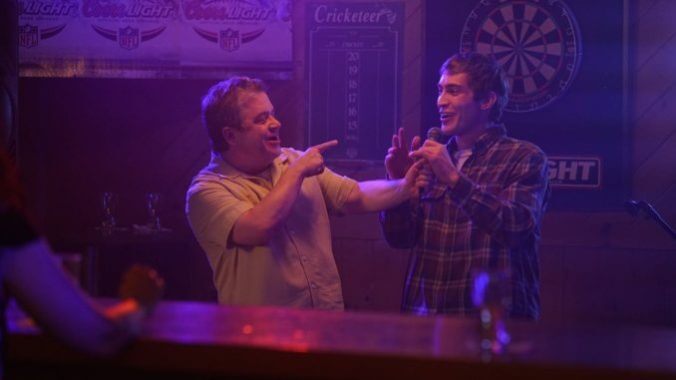For James Morosini and Patton Oswalt, Real Life Is the Punchline
Photo courtesy of Magnolia Pictures
Confessional comedy and cringe comedy rarely dovetail as beautifully as they do in James Morosini’s I Love My Dad, a semi-autobiographical film about a time when Morosoni was catfished by his own father. The film, also starring Patton Oswalt, Rachel Dratch, Lil Rey Howery, and Claudia Sulewski, masterfully ratchets up the tension and humor as Franklin (Morosini) gets increasingly more attached to “Becca”/Chuck (Sulewski/Oswalt). It is very uncomfortable to watch, but also surprisingly genuine, a testament to how strong comedy can be when it’s built on real emotions.
Personal anecdotes and self-referential humor have certainly always been a part of the comedic landscape, yet as a whole, it feels like confessional comedy has become more widespread. We see less instances of things like George Carlin’s breaking down wordplay, Jerry Seinfeld cracking jokes about retirement communities, or Demetri Martin using diagrams onstage, and instead see more comedians like Mike Birbiglia, Hannah Gadsby, Jacqueline Novak, and Joel Kim Booster talking about their personal lives and identities. Though I Love My Dad is a fictionalized take on Morosini’s own experience, it feels close to confessional comedy in that it presents a real vulnerability, a desire to share something personal to an audience of strangers in the hopes that they connect with it.
Patton Oswalt, a well-known comedian in his own right, is no stranger to sharing parts of his life with an audience. “I’m fine to take something traumatic and embarrassing and maybe turn it into comedy,” he notes over the phone. Yet comedy isn’t the only lens through which to view Morosini’s experience. I Love My Dad could have easily been a more dramatic film about a disappointing father desperately attempting to connect with his suicidal son. But Morosini found himself drawn to the comedy of the situation. He says over Zoom, “I was captured by the idea of someone doing something so wrong, but for the right reasons, and from a place of love. It had this fundamental irony to it that made me laugh.”
And true to his word, the film does make you laugh. When Franklin talks to “Becca,” Morosini chooses to have her present in the room with him, mirroring the way an online space can feel as intimate as a real one. The flip side of that is when Becca and Franklin virtually kiss for the first time, Franklin is the one present in Chuck’s room, ready for the smooch. The discomfort on Oswalt’s face as he and Morosini lock lips is both excruciating and, well, very funny. When Chuck frantically types out messages while driving, the Becca present with Franklin excitedly vocalizes the typos as if she’s a malfunctioning robot. Even with the constant underlying tension that Chuck will be found out, the movie is still able to find moments of levity.
-

-

-

-

-

-

-

-

-

-

-

-

-

-

-

-

-

-

-

-

-

-

-

-

-

-

-

-

-

-

-

-

-

-

-

-

-

-

-

-








































